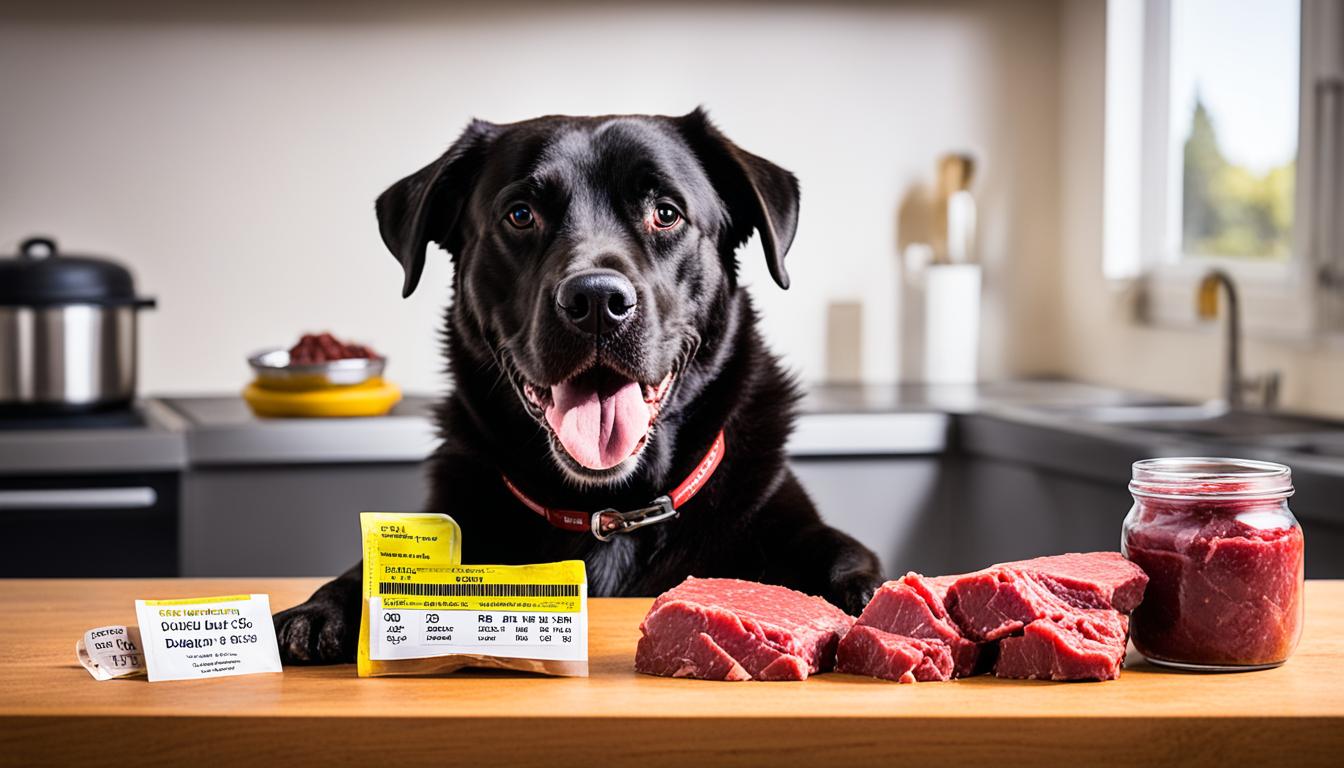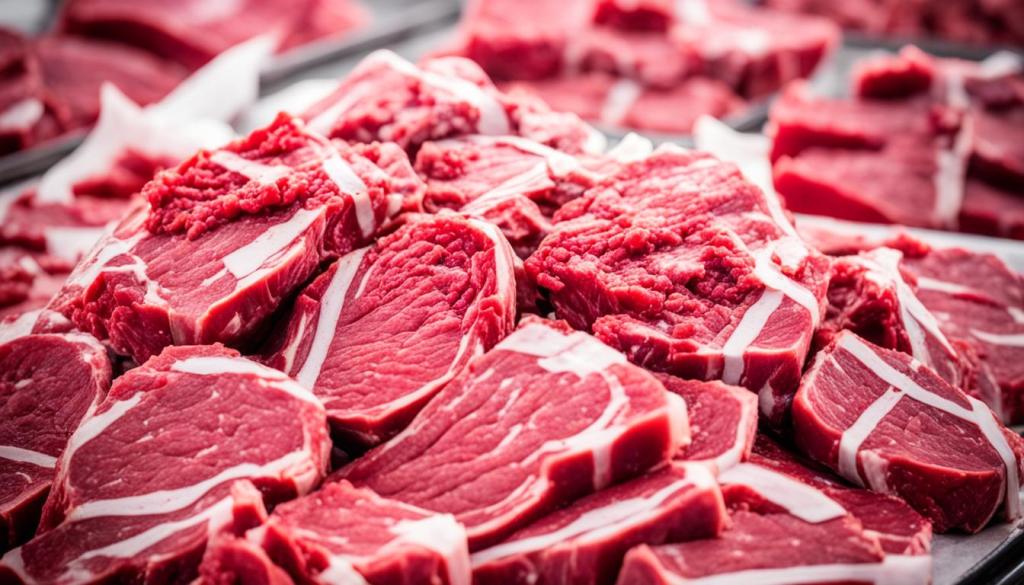As a conscious pet owner, have you ever pondered the question, can dogs eat bison? Given the rising popularity of alternative proteins in pet nutrition, exploring the feasibility and advantages of diverse diets, including bison for dogs, is essential. We delve into the details of incorporating bison, a potentially rich protein source, into your pet’s regimen. Understanding the nutritional benefits and potential risks is pivotal to tailoring a canine diet with bison that supports your furry friend’s wellness.
Key Takeaways
- Discover the nutritional potential of bison as an alternative protein.
- Learn about the suitability of bison for a balanced canine diet.
- Examine the health benefits associated with feeding bison to dogs.
- Review essential safety tips when introducing bison into your dog’s meals.
- Identify premium bison-based products tailored for canine consumption.
- Evaluate how bison stacks up against traditional meats commonly used in dog foods.
Understanding Bison as a Canine Diet Option
When considering alternative proteins for our four-legged companions, feeding bison to pets is gaining traction. But is bison safe for dogs? Like beef or chicken, bison provides a rich source of protein, essential for supporting muscle development and maintenance in canines. However, bison stands out due to its lower fat content and higher concentration of specific vitamins and minerals.
Bison also boasts a high digestibility score, meaning dogs can absorb and utilize more nutrients effectively. This is particularly beneficial for pets with sensitive stomachs or those prone to digestive issues. As with introducing new food to your pet’s diet, reviewing the change with your veterinarian is crucial, ensuring that bison complements your dog’s nutritional needs without causing adverse reactions.
An examination of bison’s place in the pet food market suggests a growing acceptance among pet food brands. A survey of commercially available dog foods and treats showcases bison as a prominent ingredient, often marketed as a ‘novel’ protein source — an alternative to the more conventional options. Here is what pet owners should consider:
- Is the bison meat sourced from reputable farms practicing sustainable ranching?
- Are there any added hormones or unnecessary fillers in the bison-based product?
- Does the product adhere to AAFCO (Association of American Feed Control Officials) guidelines?
With the proper approach to feeding bison to pets, dogs can safely enjoy its taste and nutritional benefits. As interest in bison grows as a pet food ingredient, it becomes increasingly available in various forms, from raw options to kibbles infused with bison. Pet owners seeking nutritious and safe dietary options for their dogs find bison a viable and beneficial choice.
Benefits of Feeding Bison to Dogs
Exploring the advantages of bison in a canine diet reveals a host of health benefits that can cater to dogs of all ages and breeds. As pet owners continually seek out the best nutrition options for their furry companions, understanding the specific attributes of bison meat becomes crucial. Below, we delve into the high protein content, the role of lean beef, and the essential nutrients bison offers for dogs’ well-being. Content and Its Advantages
Including high-protein bison dog food in a pet’s diet enhances its overall muscular health. Protein is a fundamental component for the growth, repair, and maintenance of muscle tissue, and bison meat is an excellent source of this macronutrient. Incorporating bison treats for dogs can support the dietary needs of active dogs, ensuring they have the energy and building blocks required for sustained health and vitality.
- Supports strong muscle development
- Facilitates efficient repair of tissues
- Provides energy for active and working dogs
The Role of Lean Meat in Canine Health
Lean meats like bison are integral for dogs requiring weight management or having certain health conditions necessitating a lower-fat diet. Bison’s lower calorie content than traditional meats while maintaining richness in flavor and nutritional value make it an ideal choice for a balanced, healthy canine diet.
- Helps in managing weight effectively
- Reduces the risk of obesity-associated diseases
- Promotes a heart-healthy diet for dogs
Essential Nutrients Found in Bison
Beyond its protein prowess, bison is also a treasure trove of essential nutrients such as iron, which plays a vital role in oxygen transport within the bloodstream, and B vitamins, which are crucial for energy metabolism and maintaining healthy nervous and immune systems. These nutrients in bison dog food make it a worthwhile addition to any dog’s diet, providing a spectrum of benefits to meet their physiological needs.
- Rich in iron for healthy blood
- Abundant in B vitamins for energy and well-being
- Contains essential fatty acids for skin and coat health
Can Dogs Eat Bison? Evaluating the Safety Concerns
Knowing the potential risks and safety protocols when considering introducing bison into your dog’s diet is essential. While many pet owners are exploring novel proteins like bison, understanding that bison is safe for dogs lays a foundation for responsible feeding practices.
Risks of Giving Bison to Dogs
Some dogs may experience allergies or digestive issues as part of the risks of giving bison to dogs. Identifying signs of adverse reactions early is critical in managing your dog’s health. Symptoms can include gastrointestinal upset, skin rashes, or more severe allergic responses requiring veterinary attention.
How to Safely Introduce Bison Into Your Dog’s Diet
Transitioning to bison should be a gradual process. Mix small amounts of bison with your dog’s food, incrementally increasing the bison portion. This allows your pet’s digestive system to adjust. Always consult a veterinarian for advice and to establish a feeding plan that suits your dog’s nutritional needs and health condition.
Best Practices for Serving Bison to Pets
Selecting the best bison dog food involves looking for high-quality ingredients and a nutritional balance tailored to your dog’s life stage and health profile. Whether choosing commercial bison dog food or preparing home-cooked meals, ensure that all bison products are cooked thoroughly to eliminate the risk of pathogens.
- Opt for reputable brands known for their quality and nutritional adequacy.
- Read labels for a comprehensive understanding of the ingredient list.
- Consult with your veterinarian to confirm the suitability of bison dog food for your pet.
Conclusion
By exploring the nutritional landscape of unconventional pet proteins, we’ve uncovered that dogs can eat bison, which is answered affirmatively. More than just an acceptable food item, bison offers robust benefits for feeding bison to dogs, including its high protein content and a range of vital nutrients that are essential to maintaining your pet’s health.



